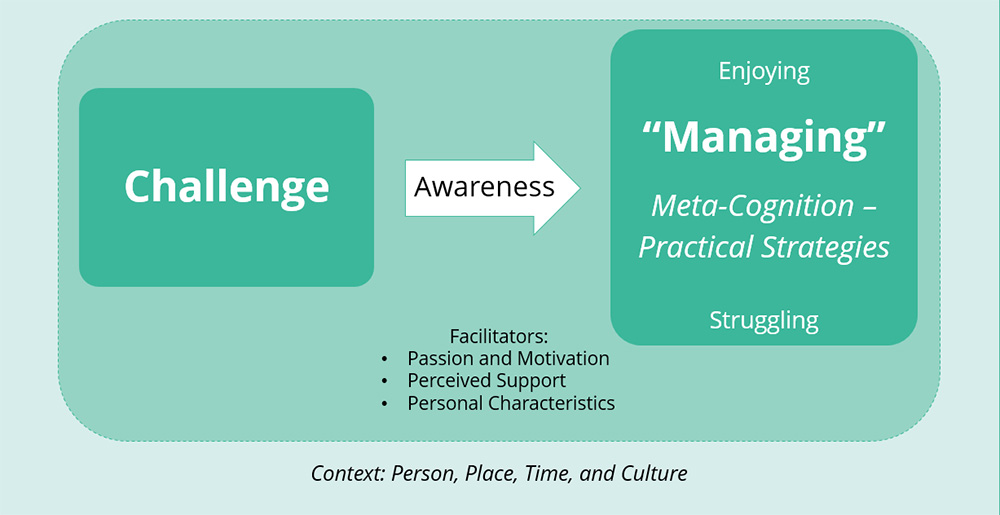Resilience is important for everyone, including students in higher education. I completed a small study with nursing graduate students, following my research with nurses in critical care. I interviewed 10 nurses who were studying for graduate degrees, to learn more about how they enact the process of resilience. These findings are part of the Resilience Plan Handout, which can support resilience and reflection.
There were many similarities to how nurses in critical care and higher education enact resilience, but also a few differences. This diagram outlines a graduate student process of resilience:

Students experienced adversity in the form of challenges. There were different experiences of adversity, which included the expectations from the program, a return to studying, and balancing responsibilities outside of school. One thing that was different between students and critical care nurses was how the adversity was experienced geographically. Critical care nurses identified workplace adversity as being specific to where they worked (which, on some level, they could avoid on days off). For students, the challenges were carried with them, and were not specific to a location. This influenced how students managed their challenges, discussed further below.
Like critical care nurses, students required awareness to manage these challenges. The awareness enabled them to identify how to respond to challenges, and what techniques to use to manage. Awareness is essential to move forward; this means, students needed to understand what the challenge was, how it was impacting them, and also what facilitators they had available. Facilitators are factors that helped them to manage challenges, and these included support from others, and their passion for their work, and motivation to complete the degree. Facilitators influenced the whole process of resilience for students, and could make a powerful, positive impact.

(Photo by Hope House Press on Unsplash)
Students had to manage what they experience, which was also similar to critical care nurses. There were differences in what these techniques were, which is understandable given the different contexts. Students used meta-cognitive strategies and practical strategies to manage their adversity. Meta-cognitive strategies are things like reframing, mindfulness, mental planning, and attempting to separate their thoughts about school from other parts of their lives. Students were aware of how they were thinking, and tried to make their thinking work for them as well as possible. For example, rather than think “I’m not good enough, I can’t do it”, they might say to themselves, “I have people to help me, just take it one step at a time.”

(Photo by Lesly Juarez on Unsplash)
Students also used practical strategies, which took on different forms. They would change study locations, to create variety and leave the house every day. They would also avoid distractions, and plan to give themselves time for their responsibilities. They also spoke about the importance of what they would eat and wear, saying that they had to take care of themselves, and couldn’t lie around in pyjamas all day. It is amazing how things like getting dressed, eating breakfast, and leaving the house were all part of the resilience process for these students.

(Photo by Carissa Gan on Unsplash)
When the resilience process was going well, students said that they were enjoying their programs. When it wasn’t going so well, they described themselves as struggling. When students were struggling, they would try and use more managing strategies and facilitators to help get themselves back on track. Students said that they used learning from past experiences, and would try different things to see what worked. This suggests that people refine their managing strategies over time, and essentially, get better at resilience with practice.
With my own experiences as a graduate student, and these findings, I can say that resilience is something that can take some work. However, resilience is complex, and you see here that there are many different aspects of the process. This was a small study, and the findings here may not work for other students. I would suggest that if the process of resilience isn’t going so well, it is important not to feel like a failure, or like it is your fault. It could be any part of the process that is not optimal, that is making things difficult. Based on this research, I suggest that students can use awareness, facilitators and strategies, to promote their resilience and manage challenges.https://youtu.be/-XhMFS8Qr-4
This study is published by the Journal of Nursing Education, and is available here.
This research was supported by King’s College London.
Jackson, J. (2018). A Grounded Theory of the Resilience Process in Postqualification Nursing Students. Journal of Nursing Education, 57(6), 371-374. https://doi.org/10.3928/01484834-20180522-09
